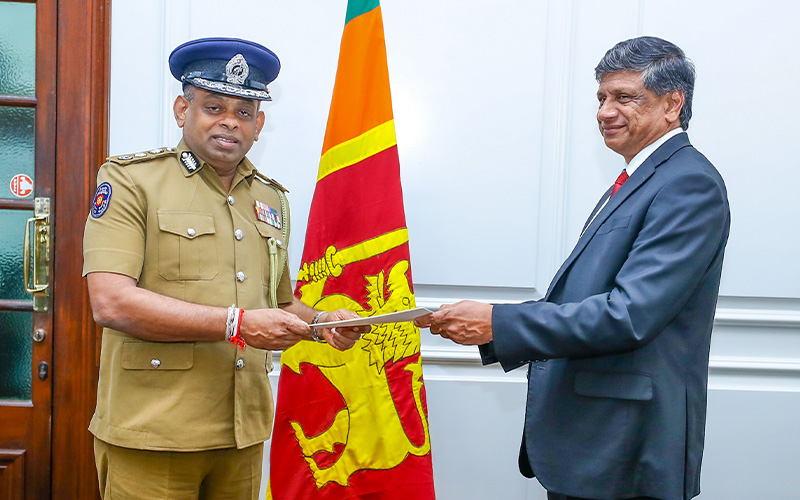
(Image courtsey: President Media Division)
Sri Lanka’s president has formally appointed Deshabandu Tennakoon as the incumbent Inspector General of Police in Sri Lanka, an official who the Supreme Court found had personally participated in torture and whose appointment had not been approved by the state's Constitutional Council.
Hours after the appointment Opposition Leader Sajith Premadasa took to his X (Twitter) handle stating the move was was “unconstitutional”.
The appointment to the post of IGP purportedly rests on the Constitutional Council. The council currently comprises Prime Minister Dinesh Gunawardena, Minister Nimal Siripala de Silva, MP Sagara Kariyawasam, and Dr Anula Wijesundera who had voted in favour of the appointment while the Opposition Leader Sajith Premadasa and MP Kabir Hashim voted against. Dr Prathap Ramanujam and Dr Dinesh Samararathne were absent.
“CC didn’t approve IGP’s appointment. Votes: 4 for; 2 against; 2 abstentions. At least 5 votes are required for a decision. The speaker has a casting vote only in case of a tie. 4/2 is not a tie! The Constitution is being blatantly violated for the second time. Shame on you speaker!” Sajith Premadasa tweeted. Despite the controversy, the President Media Division announced that the Secretary to the President Saman Ekanayake presented the appointment letter to Tennakoon at the Presidential Secretariat.
Tennakoon has been serving in the capacity of Acting Inspector General of Police since December last year after the post became vacant following the retirement of C D Wickremaratne. Earlier this month, Sri Lanka’s president defended his controversial appointment of Tennakoon as the head of the island’s police force and claimed that the Constitutional Council “is part of the Executive,” in a demonstration of his apparent willingness to consolidate power in the president’s office. In a communique it stated that the President must perform his constitutional duties such as the appointment of the IGP and any “restraint placed on the president in the performance of this duty would be in contravention of the Constitution.”
In December 2023, the Supreme Court delivered a historic judgment, holding Tennakoon personally responsible for torture. In the judgment, the court found that he had personally visited an individual in remand in a “torture chamber” for a “brief session of torture”. An affidavit from the victim said he “beat the Petitioner with a ‘three-wheel rubber band’ after stripping him naked and ordering him to rub Siddhalepa on his genitalia”.
Furthermore, the HRCL also noted in its recommendation that 24 custodial deaths in three main districts in Western Province and 13 encounter deaths involving the police took place during Tennakoon's tenure. Tennakoon has also been accused of neglecting his duty to prevent violence between pro-Rajapaksa and anti-government protesters during the 'aragalaya' demonstrations in 2022.
Read more on Tennakoon’s history of crimes by Ruki Fernando on Groundviews here.
See the full Supreme Court Judgement here.
In addition to this court case, Tennakoon was also named in another court case filed by victims of the Easter Sunday bombings that claimed the lives of over 260 people.
Three victims of the Easter Sunday bombings, filed a Fundamental Rights petition before Sri Lanka’s Supreme Court seeking an order restraining Tennakoon from accepting any further appointments as Acting Inspector General of Police. The petitioners named Tennakoon as a senior official displaying serious neglect on the part of Sri Lanka’s police and recommended taking disciplinary action against him and other senior officials.
The petitions further detailed how Colombo Archbishop Malcolm Cardinal Ranjith wrote to the Speaker expressing concerns relating to Senior DIG Nilantha Jayawardena and Senior DIG Deshabandu Tennakoon and explaining the reasons why the said individuals were not qualified to be appointed as IGP.
Since taking over last year, Tennakoon has initiated the “Yukthiya” an operation assisted by the military in an attempt to crack down on crime and drug trafficking. The operation has come under fire from UN experts as well as diplomatic missions in Sri Lanka, for several reasons including arbitrary arrest unlawful detention and allegations of torture. More recently he told a gathering to spy on each other to ensure that extremism and terrorism do not take root.
We need your support
Sri Lanka is one of the most dangerous places in the world to be a journalist. Tamil journalists are particularly at threat, with at least 41 media workers known to have been killed by the Sri Lankan state or its paramilitaries during and after the armed conflict.
Despite the risks, our team on the ground remain committed to providing detailed and accurate reporting of developments in the Tamil homeland, across the island and around the world, as well as providing expert analysis and insight from the Tamil point of view
We need your support in keeping our journalism going. Support our work today.
For more ways to donate visit https://donate.tamilguardian.com.

